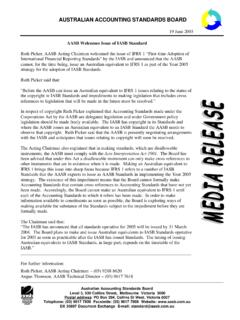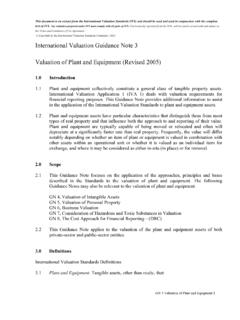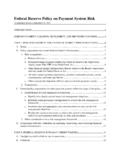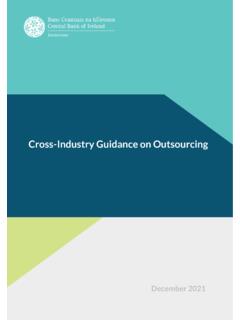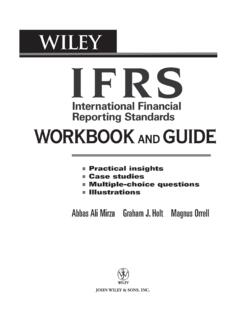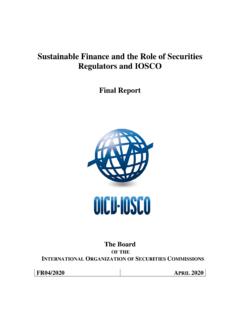Transcription of Principles of Auditor Independence and the Role of ...
1 1 Principles of Auditor Independence and the Role of Corporate Governance in Monitoring an Auditor s Independence A Statement of the Technical Committee of the international organization of securities Commissions October 2002 2 Introduction 1. The international organization of securities Commissions objectives and Principles of securities Regulation recognize that issuers should make full, accurate and timely disclosure of financial results and other information that is material to investors decisions. The Principles also recognize that accounting and auditing standards of a high and internationally acceptable quality contribute to promoting relevant and reliable financial information useful to a wide range of users for decision-making purposes.
2 Specifically, the Principles note that, among other things, regulation should be intended to ensure: An independent verification of financial statements and compliance with accounting Principles through professional external auditing. Any audit is conducted pursuant to well-defined and internationally acceptable standards. Rules designed to ensure the Independence of the Auditor . A mechanism for enforcing compliance with accounting and auditing standards. 2. The purpose of this Statement is to build on these Principles by setting forth the views of the IOSCO Technical Committee on the Principles that should govern Independence of auditors of financial statements of listed entities.
3 It reflects the interest of securities regulators in ensuring that Auditor Independence requirements contribute to promoting investor confidence in published financial statements, irrespective of whether such requirements are the responsibility of securities regulators in their jurisdictions. The Technical Committee recognizes that, while regulations on Auditor Independence exist in many individual jurisdictions, these regulations may differ in approach, scope, terminology and substance. Accordingly, the Statement also sets forth Principles relating to the oversight of an external Auditor s Independence by a body or bodies within an entity s corporate governance structure.
4 For ease of reference, this Statement uses the term audit committee to refer to such a governance body or bodies. The Technical Committee believes these Principles and the supporting guidance are relevant regardless of the specific Auditor Independence regulations that exist in a particular jurisdiction. 3. The Principles and supporting guidance relating to audit committees and similar governance bodies address such a body s role in relation to Auditor Independence only; they do not describe other significant functions that may be performed in overseeing the quality and integrity of an entity s financial reporting. Principles of Auditor Independence 4.
5 The external Auditor plays a critical role in lending independent credibility to published financial statements used by investors, creditors and other stakeholders as a basis for making capital allocation decisions. Indeed, the public s perception of the 3 credibility of financial reporting by listed entities is influenced significantly by the perceived effectiveness of external auditors in examining and reporting on financial statements. While any consideration of the effectiveness of external audits involves a wide variety of issues, it is fundamental to public confidence in the reliability of financial statements that external auditors operate, and are seen to operate, in an environment that supports objective decision-making on key issues having a material effect on financial statements.
6 In other words, the Auditor must be independent in both fact and appearance. 5. The importance of Auditor Independence standards that are reasonable and yet comprehensive, rigorous, robust and enforceable has been underlined by several significant corporate failures in which questions have been raised about the quality of financial reporting and, in particular, the Independence of the Auditor . The Technical Committee therefore encourages national and international professional accounting bodies to continue to work with regulators to strengthen existing national and international standards governing Independence . Strengthened Independence standards that, to the extent possible within the constraints of national laws, are consistent internationally, are a necessary element in reassuring the investing public that auditors are in a position to exercise objective judgment in concluding on management s representations in an entity s financial statements.
7 6. auditors of listed entities should be independent, both in fact and in appearance, of the entity being audited. 7. Standards of Independence for auditors of listed entities should be designed to promote an environment in which the Auditor is free of any influence, interest or relationship that might impair professional judgment or objectivity or, in the view of a reasonable investor, might impair professional judgment or objectivity. 8. At present, the details of specific regulations and professional standards governing Auditor Independence vary from jurisdiction to jurisdiction, sometimes significantly. Differences relate to matters such as: the scope of persons and entities, both within and outside the audit firm, to whom Independence rules apply; the types of financial, business or other relationships that an audit firm or individual within a firm may have with an entity that the firm audits; the types of non-audit services that can be provided by an Auditor to an entity that it audits; and the safeguards that need to be implemented to protect against threats to Independence .
8 9. Despite these differences, the Technical Committee has noted a growing consensus among securities regulators as to the nature of the threats to an Auditor s Independence and the limitations on the extent to which those threats can be mitigated by voluntarily applied safeguards of various types. Further, there appears 4 to be a growing consensus among securities regulators that a framework of Principles governing Independence is not sufficient in itself to protect investors without the greater clarity provided by specific prohibitions on activities and relationships considered unacceptable regardless of any safeguards applied.
9 10. The Technical Committee believes there is also a growing consensus that: establishment of standards governing Auditor Independence is not sufficient of itself to provide assurance that auditors are in fact independent; the standards must be supported by rigorous requirements for audit firms to establish and maintain internal systems and processes for monitoring, identifying and addressing threats to Independence and ensuring compliance with the standards. the adequacy and effectiveness of audit firms internal systems and processes relating to Independence must be assessed and evaluated by an external oversight body (see IOSCO Technical Committee Statement on Principles for Auditor Oversight, October 2002).
10 A governance body independent of management of an entity being audited should oversee both the process of selection and appointment of the external Auditor and the conduct of the audit. 11. The Technical Committee has not in this Statement attempted to prescribe comprehensive standards of Auditor Independence and nor is it endorsing any particular existing set of Auditor Independence standards. The Committee notes, however, that the Code of Ethics for Professional Accountants of the international Federation of Accountants provides a useful analysis of potential threats to an Auditor s Independence under the following headings.

